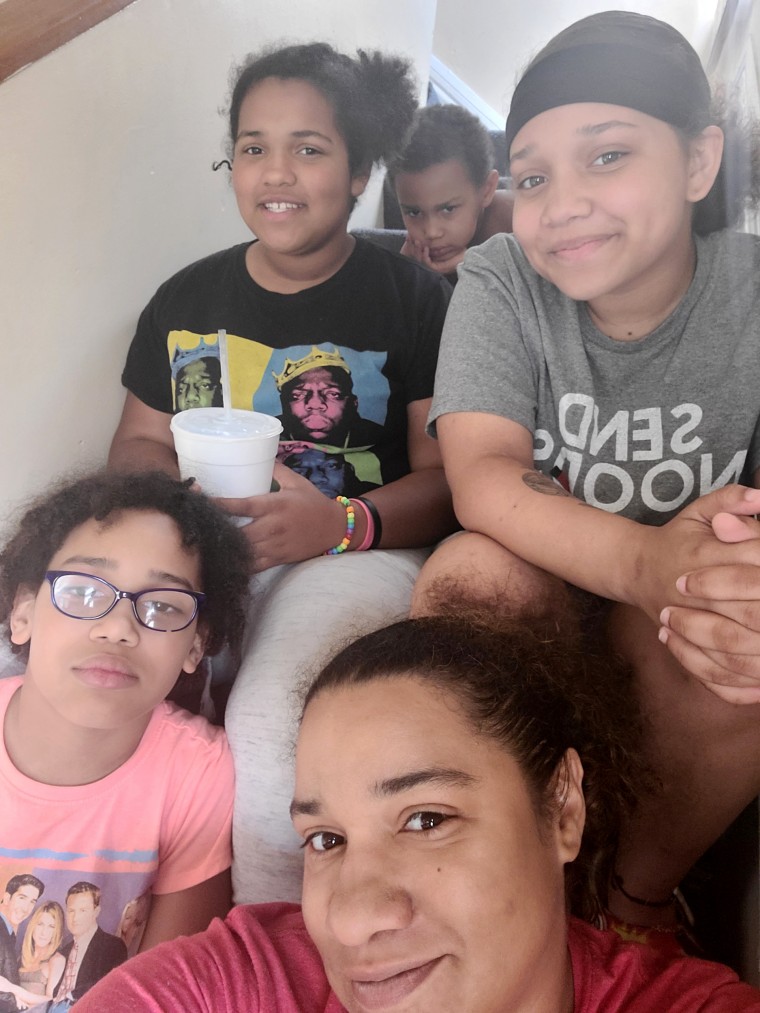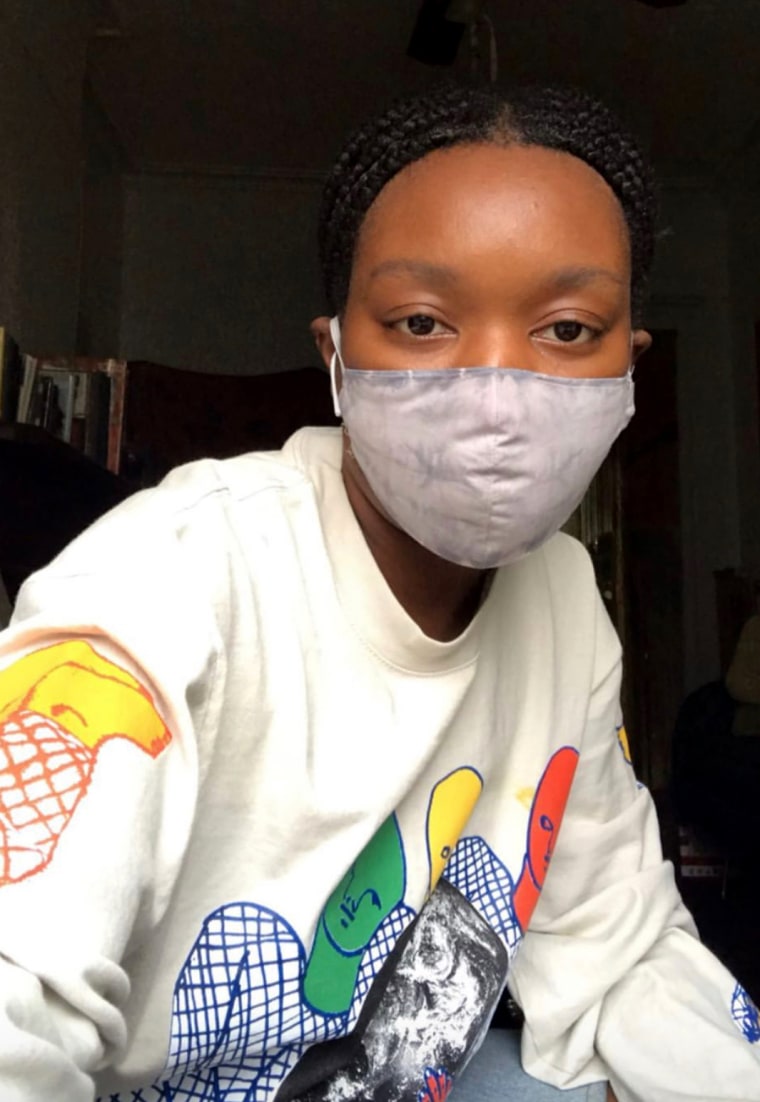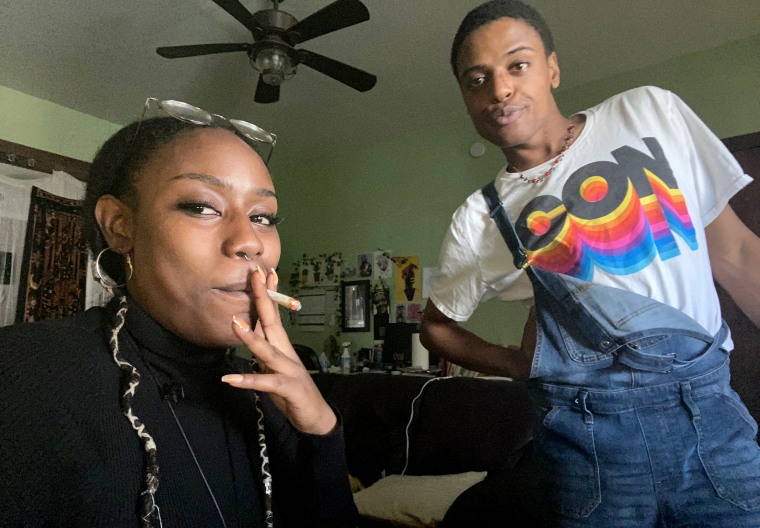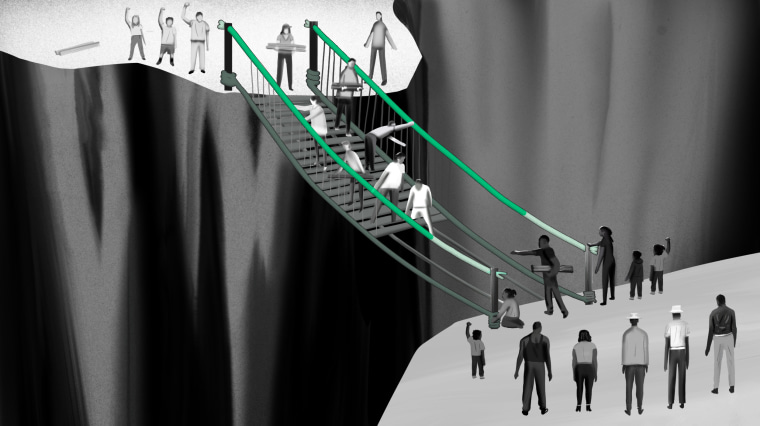At an extended-stay hotel on the outskirts of Louisville, Kentucky, Kinisha Carey stepped outside to get some air.
Carey and her five children had been evicted from their home in west Louisville in February 2020, because she couldn’t pay rent after losing her job. The family had been moving between temporary housing for months. At that point, Carey was struggling with anxiety and depression.
“The domino effects of life,” she says.
Finally alone that evening in July 2020, she typed a message on Facebook to her friend Chanelle Helm, a community organizer, asking for help.
Carey said her message said “something along the lines of, ‘I don’t know if I’m going to be alive for the rest of the day.’”
Within minutes she received a response. Helm wanted to help.
Helm could pay her rent, groceries and transportation for as long as it took Carey to get back on her feet. The money, Carey eventually learned, came from a Louisville organization called Reparations Roundtable.
The group is one of a small cohort that has popped up in recent years that are using social media to crowdsource funds to distribute to Black people, and calling these efforts a form of reparations. Especially through the pandemic and the racial justice movement, efforts like Reparations Roundtable have been expanding and can now process thousands of dollars a month. Such groups coordinate dozens of volunteers and boards of directors and, one has registered as a nonprofit.

While crowdfunding and mutual aid are not new concepts, these groups reflect a new stage within the centuries-old reparations debate over slavery, economic inequality and the social safety net. Specifically through education and outreach on social media, organizers are trying to make reparations something that everyone can participate in — particularly white people with disposable income or inherited wealth.
Yet despite the growth of these crowdfunding campaigns, some experts are concerned that focusing on individual reparations might distract from the effort to secure reparations on a federal level.
“The relevant party that bears responsibility is the federal government,” said William A. Darity Jr., a professor of public policy, African and African American studies, and economics at Duke University, and a reparations scholar. “This is not a matter of individual guilt.”
Organizers respond that not only should their work be considered a legitimate form of reparations, it is an essential part of the larger movement.
How these groups work
Through Reparations Roundtable, Carey’s rent and expenses were paid for three months. Volunteers dropped off books for her children, coordinated apartment rentals and bought them groceries.
“Every bit of my involvement with her led to a place where I can breathe right now,” Carey said about Helm.
Reparations Roundtable, which Helm co-founded in 2017, has a staff of seven volunteers, all of whom are white.
Using different social media platforms, and their personal networks, these volunteers raise money to support about 35 people on a regular basis and to support other efforts, such as eviction prevention and bail programs. Individuals are supported financially, or in-kind, for as long as it takes them to return to stability.
Most of the people are in crisis, although payments also go to new mothers, arrested people and students struggling to afford higher education, for example.
Reparations organizers interviewed for this article have each developed different policies for collecting and distributing payments. They have adapted grassroots organizing techniques to give cash, pay bail and cover rent for Black people, in most cases prioritizing Black trans people. Recipients of these reparations either reach out to the organizations directly or are identified by community organizers such as Helm.
As with other reparations-based organizations, Reparations Roundtable vets recipients through a social media search or an interview process.
“We engage with folks,” Helm said. “We want folks to understand that this is a new way of getting support and getting things stable.”
The primary mode of crowdsourcing for Reparations Roundtable is Facebook. To enter the private group, which has 170 members from across the country, donors commit to paying $25 a month and following community guidelines, which includes “fight white supremacy.”
Liz Cardenas, who is white, is an administrator for the Facebook page, and joined Reparations Roundtable two years ago. “When there is a wrong that is committed by one group of people against another, there needs to be some repair,” she said. “You can’t go along as if nothing has happened.”
The earliest calls for reparation for slavery
Calls for reparation from the federal government for enslavement began shortly before the Civil War ended in 1865.
The Rev. Garrison Frazier, who represented newly emancipated slaves in the Confederate states, told Gen. William Sherman and Secretary of War Edwin Stanton that their biggest need was land. The demand for “40 acres and a mule,” however, was ultimately rejected by President Andrew Johnson, and any initiative to make reparations for the allowance of slavery never materialized.
Meanwhile, organized mutual aid dates back to the slave era. The National Ex-Slave Mutual Relief, Bounty, and Pension Association, founded in 1898 by former slaves to lobby the government for a federal pension program, was the first mass reparations movement led by African Americans, according to historian Mary Frances Berry. At its height the organization claimed hundreds of thousands of members nationwide.
Callie House, the organization’s founder, traveled the country and met with former slaves in churches.
In addition to pensions from the federal government, the people she met wanted money for mutual aid, “so that when somebody got sick, or when they died, or whatever happened and there was a need, there would be some pot of money, however small, to draw from to help people,” Berry said.
Calls for reparation have continued to today. Even preceding Reparations Roundtable was the Facebook group Reparations: Requests and Offerings, run by a Seattle-based conceptual artist, Natasha Marin.
In 2017, the Reparations Roundtable came together in Louisville. In 2018, the group Tucson Reparations was formed in Arizona. Other similar groups formed during the pandemic in Cleveland; Brooklyn, New York; Philadelphia; and Austin, Texas.
All of the organizers interviewed said they are in favor of H.R.40, the federal legislation that would establish a federal commission to consider reparations for slavery.
Money moves
In the beginning of the pandemic, Venmo handles of people seeking financial assistance were distributed widely across social media.
From March 20 to March 24, 2020, more than 10,000 Covic-related GoFundMe campaigns were created, The New York Times reported. From March to August 2020, over 150,000 new campaigns were created, together raising more than $625 million, according to GoFundMe’s year-end report.
These fundraising efforts and individual requests take advantage of online payment platforms such as Venmo, PayPal and GoFundMe, which allow users to easily send money.
Meanwhile, fueled by the simultaneous racial justice movement, the concept of reparations re-entered general conversation.
In the aftermath, curated social media posts about race and reparations have been going viral, easily reaching thousands of people.
In June, the podcast Reply All dedicated an episode to the phenomenon of white people sending money to their Black friends out of the blue through Venmo, with some writing “reparations” in the subject line.
The podcast host Emmanuel Dzotsi heard from people “all over the country” who were receiving these payments after the murder of George Floyd in May 2020.
Reparations organizers saw how direct giving online ebbed and flowed with the news cycle. After Floyd's murder, the Facebook group Reparations: Requests and Offerings grew from 15,000 members to 21,000 members in just a few weeks. The account Deepwaters.pool raised over $2,000 on its first day in June.
Reparations Roundtable in Louisville raised over $50,000 in the two days following the announcement that the police officers involved in the home raid in which Breonna Taylor was killed would not be charged.

“Those types of surges happen when something terrible happens,” Didi Williams, the Reparations: Requests and Offerings administrator, said. “It’s like an outpouring of guilt.”
Organizers in Cleveland redistributed over $40,000 in cash and another $40,000 in donated goods and services. The response was so “astronomical,” organizer Erin McCardle said, that by September the group freezed its own accounts to properly process the funds.
These surges in donations are a “double-edged sword,” said McCardle, who is white. “We’re still going to make sure the money gets redirected,” but “ultimately this is a problem. It’s not long-term engagement.”
Since closing down, and doing a “deep analysis,” Reparations Now has trained 40 more volunteers and shifted the leadership structure to ensure that decisions about the distribution of money are made by local Black and Indigenous leaders.
‘We saw the despair’
Ming, 25, who goes by one name and uses they/them pronouns, and roommate Khadijah Rose launched a GoFundMe drive with another roommate, Sunny Marks, for Covid-related supplies for the Black trans community in Philadelphia. They tripled their fundraising goal.
The whole situation, especially in the beginning of the pandemic, was “quite uncertain and scary,” Ming said. They were hand-delivering personal hygiene kits including PPE, and giving out micro-grants. Out of that success Ming and Rose formed the Coalition for Black Trans Economic Liberation.
Black trans people have been more likely to have their work hours reduced and pay cut, to take unpaid leave and to switch to part-time work during the pandemic, according to the Human Rights Campaign, the LGBTQ advocacy organization. They were forced to change their household budgets and struggled to pay bills in higher numbers than any other demographic group surveyed.
Rates of violence against transgender people of color have also been increasing, or increasingly reported, over the years.

“We saw the despair,” which was compounded by protests and economic instability, Ming said.
Ming said they chose the name Coalition for Black Trans Economic Liberation because “I felt like that was the most necessary thing right now.”
This fall, the coalition became a nonprofit in the state of Pennsylvania. In addition to a Slack channel and a board of directors, it has also set up a 24-hour hotline. In June they had distributed over $20,000.
“But at the same time, we understand that, you know, it’s not just about money,” Ming said. “It’s about education, it’s about access, it’s about self actualization. It’s about so much more than that.”
Not everyone agrees on calling these efforts "reparations"
In addition to the growth of online reparations crowdfunding, cities and states have been increasingly developing and implementing local reparations legislation.
Recently, 11 cities, including Los Angeles and Denver, signed a pledge to implement local reparations programs. The initiative is described as part of a larger effort to “move the needle” on reparations.
The phenomenon of crowdfunded reparations, as well as municipal and state-level reparations legislation, concerns people such as Duke’s Darity, who described these initiatives as “piecemeal” programs.
“Individuals who do feel a sense of obligation, the most important thing that they could do is lobby and petition Congress for a national reparations program for Black American descendants of slavery,” Darity said.
“I have no objection to people making online donations,” he adds. “I just don’t want them to call it reparations.”
Organizers say they understand how politically fraught the term reparations has become. Ming said that’s why they opted to use “economic liberation” instead.
“We’ve had to learn to say reparations without saying it,” Ming said.
In changing the name and focusing on education, “we’ve gotten way more of a turnout,” they said. “People are coming from a place of understanding and not obligation.”
